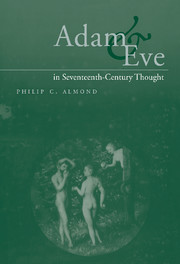6 - The Fall
Published online by Cambridge University Press: 18 November 2009
Summary
METAPHORS OF THE FALL
And the woman said, The Serpent beguiled me, and I did eat.
Genesis 3.13The story of the Fall in the book of Genesis is bordered on the one hand by unclothed shamelessness (Genesis 2.25) and on the other by clothed shame (Genesis 3.21). So it is not surprising that a sexual act was often seen as the cause of the transition, and the expulsion from Paradise its consequence. The sexual Fall was present in the Jewish tradition from the time of Philo's allegorical interpretation, and in the Christian tradition from Origen's. And there were rabbinic precedents for the view that the Fall occurred as the result of the seduction of Eve by the serpent. Around the first century, The Book of the Secrets of Enoch had Eve sexually seduced by a fallen angel.
These traditions of a serpentine and an angelic sexual assault on Eve come together in Jacob Boehme. The serpent, which to Boehme signified sexuality, appeared to Eve as ‘an exceeding well-favoured, comely handsome, neat fine, brave pretty beast, accurately drest, and set forth, according to the pride of the Devill …’ The essence of the serpent entered into her as a result of her desire to be a goddess, and her heavenly essence died. The serpent, ‘being it was the most suttle Beast among all the Beasts … slew Eve her virgin-like chastity, that she lusted after the beastiall copulation; thereupon we understand in the Serpents property, the desire of [carnal] brutall copulation, and all unchastity, wanton uncleannesse, and Beastiall Whoredome of man’.
- Type
- Chapter
- Information
- Adam and Eve in Seventeenth-Century Thought , pp. 173 - 209Publisher: Cambridge University PressPrint publication year: 1999

